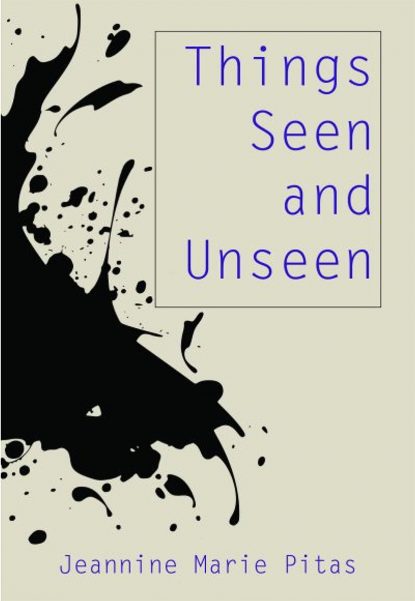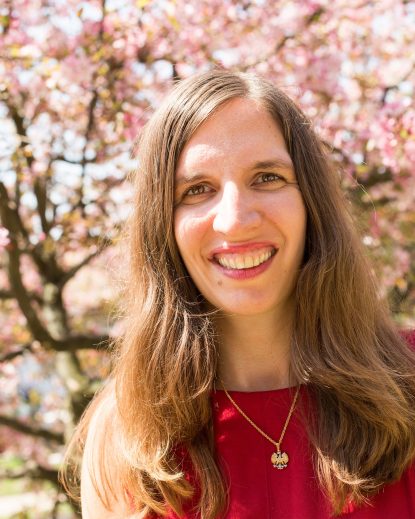
This is the book cover for “Things Seen and Unseen,” a collection of poems, by Jeannine Marie Pitas. (CNS photo/Jeannine Marie Pitas)
In glistening language, Jeannine Marie Pitas’ poetry collection, “Things Seen and Unseen,” invites readers to the place where the mundane borders on the extraordinary, where what we can know with our senses is only part of the story.
Broken into four sections, the collection explores various ways of seeing and being. Using 2 Corinthians 4:18 (“We look not to what is seen but to what is unseen; for what is seen is transitory, but what is unseen is eternal”) as an epigraph, Pitas helps readers recover the sight of children, who, in the poem “What the Children Get” are shown to be skilled at navigating the depths of this life:
“They do not know how well
they steer, nor can they see
what they do for the world —
the maps they make, the hidden
rivers they discover, the trees they name.”
Approaching the world with an eye for both the visible and the invisible often comes naturally to the child. The vocation of poet also calls for a return to the child’s way of seeing.
The speaker of these poems has seen much: In “Gravity,” which reflects a family member’s failing memory, she says, “I’ve started to think/ about the way it felt/ when words dissolved into curves and lines,/ when the people in the old photographs/ lost their names.” And yet, as she reflects in “Idyll,” she still longs after the ideal:
“Let me write of a child who counts
the shiny backs of turtles
rescues them from dump trucks
who traps frogs, stares into their
enormous eyes, and lets them go.”
[hotblock]
This ideal is juxtaposed in the poem “When We Were Human,” where the speaker notes how our modern adult life takes us far from nature and one another: “Now that we would never stop to stroke the scales of a forest snake./ Now that we don’t stand up to pray the Angelus at noon, and our/ voices no longer touch each other like folded hands.”
Without the compass of others in the world around us — a world that is described in the opening poem of the collection as an “ornament” hung “from a bare bough/ of a tree fallen at the roadside” — we believe “we should be grateful, as we drift from now to now.”
In an ever-present that absents the past, future and sometimes our very consciousness and attentiveness, the speaker concludes that we are not as human as we once were.
How to recover this humanity? In the last two sections of the collection, titled “What the Compass Says” and “Seeds,” faith offers both direction and promise of future growth. However, holding onto this faith is no easy task.
In “Proof,” the speaker grapples with the indelible mark faith has left on her despite the reality that other voices have “proven” God to be a myth:
“I walk this winding, wet path of illusion,
through these desolate cities,
these polluted fields,
these bare, sharp-edged mountains.
I call you and call you
and I’ll never stop calling.”

Jeannine Marie Pitas is a Catholic writer, poet and translator. “Things Seen and Unseen” is her first book of poems. (CNS photo/courtesy Dawn Zacharias)
Though God is certainly present in our liturgies and at Mass, the speaker finds him more readily in the ordinary and even in the difficult moments of life, in the “tough crusts of bread …/ in bedbugs, wrong turns,/ the slippery rocks that loosen my steps/ over valley streams,” in the 72-year-old homeless man in the poem “Grey, Wingless Angels” who comes to the speaker’s door and “asks for a glass of milk.”
Perhaps poetry’s greatest gift is to humble us by revealing the extraordinary in our midst, to attune us to our need — like at the end of “Rosary,” where the speaker admits, “Now, I no longer resent these knots –/ this rope that sustains/ this net that enfolds.”
Jeannine Marie Pitas’ “Things Seen and Unseen” asks readers to awaken to the world contained in a plant, a fellow person, and as the speaker says in the closing poem of the collection, to “a word/ that will make a stranger/ stop in her tracks/ look into my eyes/ and softly murmur,/ ‘I know you.'”
We long to be seen, to be loved eternally, and, as these poems reveal, there must be Someone who does. He is the unseen that meets us in the ordinary and transforms it.
***
Weishar is a poet and freelance writer.
PREVIOUS: Readings of the Holy Mass – Fourteenth Sunday in Ordinary Time
NEXT: Jesus shakes our complacency into actions of mercy


Share this story